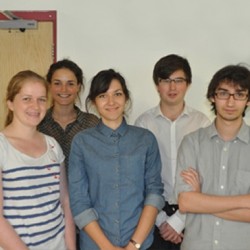By Helen Figueira
August 20, 2012
Time to read: 3 minutes
 Summer Studentship Scheme
Summer Studentship Scheme
No academic education can quite prepare someone for the reality of scientific research. The trials and triumphs of laboratory work can only be truly appreciated when experienced first-hand. Each summer, research groups at the CSC invite some of the brightest undergraduate and A-level students into their labs. Over 4-8 weeks, the students independently carry out research projects that form part of the groups’ ongoing research.
The placements are funded by the Nuffield Foundation. This year, the projects covered a wide range of biomedical topics, from the long-term effects of cannabis use on the glutamate system to the effect of nitric oxide on mitochondrial activity. Tamsin Samuels, currently studying Natural Sciences at Cambridge, joined the Quantitative Systems Biology Group. Her research aimed to precisely quantify two key proteins in the NAFT/Calcineurin pathway – a signalling pathway crucial to the body’s immune response to a variety of diseases. “It’s been good to see what this sort of science is really like early on,” she says. “Practical work that we do at university is nothing like this: the experiments have been done thousands of times before, you know what to expect, and nothing ever goes wrong. Here you’re discovering things for yourself, for the first time. It can definitely be frustrating when you spend a very long time perfecting one small process, but it’s worth it. When things worked, it was more rewarding.”
Cornelia Roibu, a biochemistry undergraduate from the University of Oxford working in the Neuroplasticity and Disease Group, agrees: “It makes it much more exciting when things work if you’ve overcome the problems in this way.” The scheme gives students a taste of research far removed from their undergraduate or school learning. For Jack Binysh, a physics student from Oxford working the Computational Regulatory Genomics Group, the work was a new challenge. “My course doesn’t include any computational work, so it was a bit of a shock. But now that I’ve done this I’m hoping to take these skills into my undergraduate research project next year.”
At the conclusion of the experience, each student presents their work and findings to the their peers and scientists of the CSC. James Leiper, head of the Nitric Oxide Signalling Group, was impressed. “They are all very enthusiastic and bright, and can see the benefit of applying basic science to understand the underlying mechanisms of disease.”
“The scheme works both ways,” he adds. “The students get a rare and beneficial experience, and we identify talent that might be suitable for our PhD programmes.” For more information about the scheme click here, or contact Kate Baird, Student Administrator.